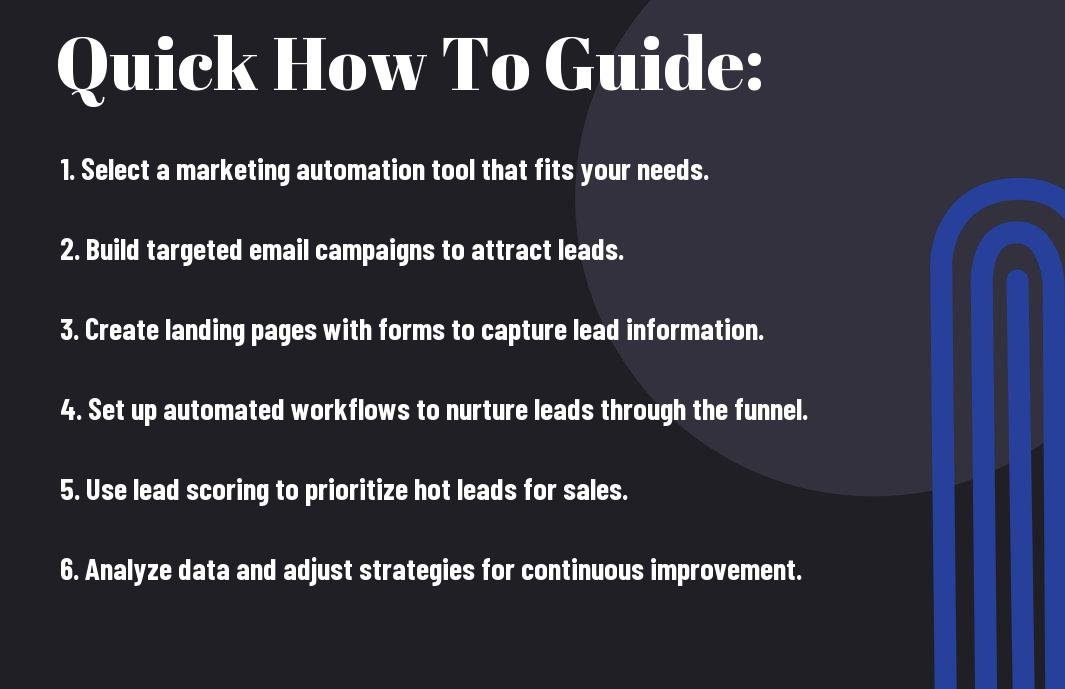Generating leads is crucial for any business looking to grow and expand. With the powerful tool of marketing automation, businesses can effectively streamline their lead generation process, saving time and resources. By utilizing automated workflows and targeted campaigns, businesses can capture leads, nurture them, and convert them into loyal customers. In this guide, we will walk you through the steps to implement marketing automation successfully, covering the benefits, best practices, and potential pitfalls to avoid. With the right strategies in place, your business can boost lead generation efforts and achieve sustainable growth.
Key Takeaways:
- Automate repetitive tasks: Marketing automation helps in automating repetitive tasks like sending emails, updating CRM systems, and nurturing leads in a personalized way.
- Segment leads effectively: Utilize marketing automation to segment leads based on demographics, behavior, and interests, allowing you to tailor your messaging and content for higher engagement.
- Lead scoring and nurturing: Implement lead scoring to prioritize leads based on their level of interest and engagement, then use automated workflows to nurture them with relevant content until they are ready to convert.
- Integrate marketing automation with CRM: Integrate your marketing automation system with your CRM to ensure seamless data flow between marketing and sales teams, enabling better lead management and tracking of customer journeys.
- Analyze and optimize campaigns: Utilize the data and analytics provided by marketing automation tools to track the performance of your campaigns, optimize them in real-time, and improve your lead generation strategies over time.

Setting Up Your Marketing Automation System
Selecting the Right Marketing Automation Software
Assuming you have decided to implement marketing automation for streamlined lead generation, the first step is selecting the right software for your business. Your
marketing automation software should align with your goals, budget, and technical requirements. Make sure to choose a platform that offers robust features such as lead scoring, email marketing, and workflow automation. Consider the scalability of the software as your business grows.
Integrating with Your CRM
Now, it’s time to integrate your chosen marketing automation software with your Customer Relationship Management (CRM) system. This integration is crucial for seamless communication between your marketing and sales teams, ensuring that all leads are effectively nurtured and followed up on. Integrating your CRM with your marketing automation system enables you to track the entire customer journey from lead acquisition to conversion.
For instance, a prospect who downloads a whitepaper from your website can be automatically added to your CRM system as a lead. The lead can then be enrolled in a targeted email campaign through the marketing automation platform, based on their behavior and interactions with your content. This integration streamlines the lead nurturing process and improves overall conversion rates.
Developing Automated Marketing Campaigns
Many businesses are leveraging marketing automation to streamline their lead generation efforts. Developing automated marketing campaigns is a smart way to nurture leads efficiently and increase conversions. By creating targeted campaigns that are triggered by specific actions or behaviors, businesses can deliver personalized content to their audience at the right time, leading to better engagement and ultimately, more sales.
Tips for Crafting Effective Email Sequences
Many businesses struggle with creating effective email sequences that engage their leads and drive them towards a conversion. Here are some tips to help you craft compelling email sequences:
- Segment your audience: Sending personalized emails based on the interests and behavior of your leads increases engagement.
- Create valuable content: Offer informative and relevant content that provides value to your audience.
- Include a clear call-to-action: Guide your leads on what steps to take next to move them through the sales funnel.
The key to a successful email sequence is to provide relevant content that resonates with your audience and prompts them to take action.
Utilizing Social Media in Automation
You can further amplify your marketing efforts by utilizing social media in your automation strategy. By incorporating social media into your automated campaigns, you can reach a wider audience and engage with your leads across multiple platforms. Social media automation tools allow you to schedule posts, track performance, and interact with your audience in real-time, making it easier to maintain a consistent presence online.
To maximize the impact of social media in your automation strategy, focus on platforms where your target audience is most active, and tailor your content to suit each platform’s unique features. By leveraging social media in your automated campaigns, you can expand your reach and strengthen your brand presence online.
Lead Scoring and Nurturing Strategies
How to Establish a Lead Scoring System
Keep your lead generation efforts targeted and efficient by implementing a lead scoring system. This involves assigning point values to specific actions or demographics that indicate a lead’s level of interest or likelihood to convert. By defining criteria for scoring leads, you can prioritize and focus on those most likely to result in sales.
Factors That Enhance Lead Nurturing Processes
While lead scoring helps identify promising leads, effective lead nurturing processes are crucial for moving leads through the sales funnel. Personalization, timely communication, and valuable content are key factors that enhance lead nurturing. By delivering the right information at the right time, you can build trust and credibility with potential customers.
- Personalization: Tailoring communication to individual leads increases engagement and builds rapport.
- Timely communication: Responding promptly to inquiries and providing relevant information when needed shows responsiveness and professionalism.
This tailored approach can significantly increase the chances of converting leads into customers.

Measuring the Success of Your Automation Efforts
Analyzing Marketing Automation Metrics
One necessary aspect of utilizing marketing automation for lead generation is analyzing the metrics derived from your automated campaigns. Metrics like click-through rates, conversion rates, and lead engagement can provide valuable insights into the effectiveness of your automated workflows. By closely monitoring these metrics, you can identify areas for improvement and make data-driven decisions to optimize your lead generation efforts.
Adjusting Strategies for Optimal Performance
On the journey to streamline lead generation through marketing automation, it is crucial to regularly assess and adjust your strategies for optimal performance. This means fine-tuning your automation workflows based on the metrics and performance data you collect. By making informed adjustments, you can ensure that your automated campaigns are consistently delivering results and maximizing lead generation potential.
Understanding the data and insights provided by your marketing automation platform is key to unlocking its full potential. By identifying patterns, trends, and areas that need improvement, you can refine your strategies to achieve optimal performance. Keep experimenting with different approaches and be willing to pivot based on the metrics to ensure your marketing automation efforts are driving the desired outcomes.
Conclusion
With this in mind, utilizing marketing automation for streamlined lead generation is imperative for today’s businesses to efficiently attract and nurture potential customers. By leveraging automation tools to create personalized and targeted campaigns, businesses can effectively capture leads, nurture them through the sales funnel, and ultimately convert them into loyal customers. It is crucial for businesses to invest in marketing automation strategies to stay competitive in the digital landscape and drive overall business growth.
FAQ
Q: What is marketing automation?
A: Marketing automation refers to the use of software platforms and technologies to automate marketing tasks, such as sending emails, managing social media, and tracking website interactions. It allows businesses to streamline their marketing efforts and target leads more effectively.
Q: How can marketing automation help with lead generation?
A: Marketing automation can help with lead generation by enabling businesses to create targeted campaigns that reach the right audience at the right time. It allows for personalized communication with leads, nurturing them through the sales funnel until they are ready to make a purchase.
Q: What are some key strategies for utilizing marketing automation for streamlined lead generation?
A: Some key strategies for utilizing marketing automation for streamlined lead generation include creating automated email workflows based on lead behavior, segmenting leads into specific lists for targeted campaigns, and integrating marketing automation with customer relationship management (CRM) systems for a seamless lead nurturing process.